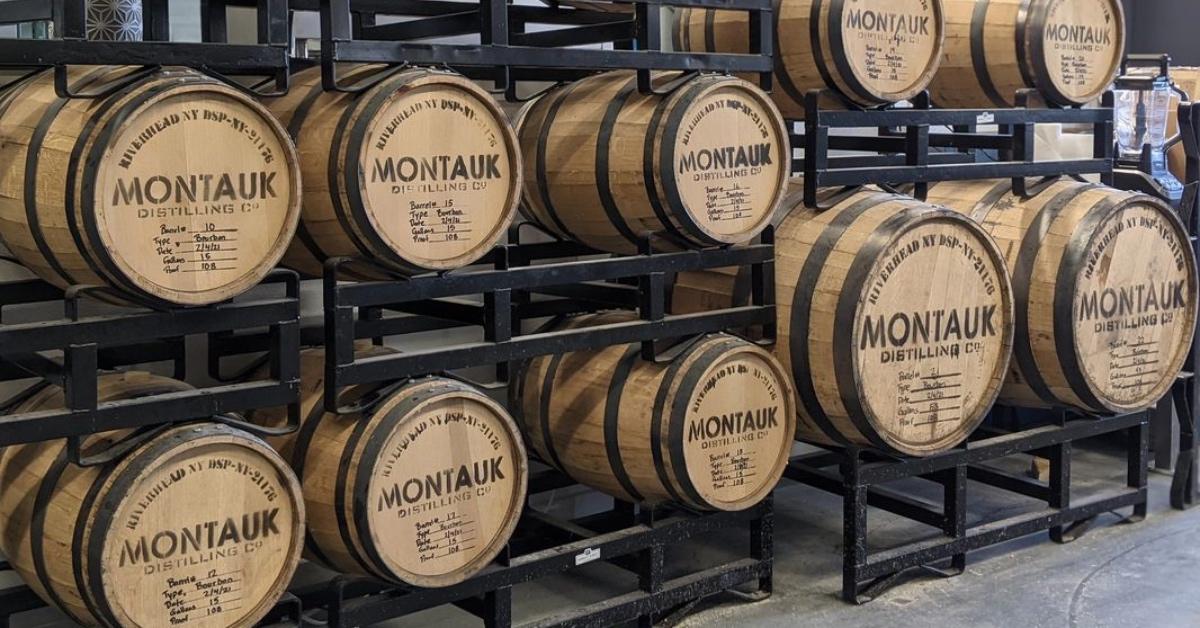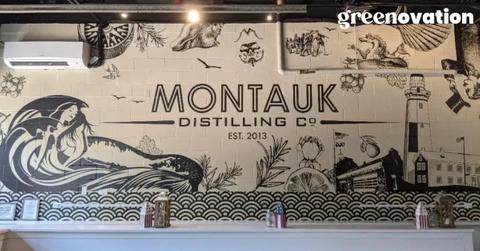When you think of the spirits industry, you probably don't think of it as sustainable — after all, ethanol, one of the main components of most alcoholic beverages, is a greenhouse gas. But one person's family-owned business, Montauk Distilling Co., is looking to change how the distilling process is shaped for a better future for us all.
As part of our Greenovation series, Green Matters spoke to Leucio Iacobelli to discuss why he chose to make Montauk Distilling Co. sustainable — aside from it being "the right thing to do."
Iacobelli first founded the company in 2013 after creating a rum as a proof of concept, and his initial creations were crafted in Westhampton Beach. Due to some constraints of life on Montauk, including the infamous one-lane highway, the physical location of the business is in currently Riverhead, Long Island. Read on for our Q&A with Iacobelli.
This interview has been edited and condensed for length and clarity.

GREEN MATTERS: Throughout your learning about the spirits industry, have you learned anything that surprised you?
LEUCIO IACOBELLI: What we've found horrifying is the amount of water we use. Not to proof it down, but to cool off our product. We use a lot of water to cool our condenses. And we're trying to figure out ways of reusing that water. The water that is hot water, we use it to heat our tanks to get a proper, better fermentation on the colder weathers or we process it and we filter it again. Then we use it for our crops.
GM: So, what inspired you to pursue the sustainability aspects of your business?
LI: Well, I honestly think it's our responsibility. It's the right thing to do. As you know, MDC, Montauk Distilling Company, makes ethanol, which eventually becomes a distilled product.
We have two licenses. The A-1 license allows us to purchase other beverages or actually other spirits from distilleries. But the Farm License is something that we want to keep within New York State, upstate, downstate, and Long Island.
We buy local products. And wheat, corn, or rye are the primary three ingredients that we we buy. We use it, we measure it, and the byproduct is a spent mesh. We have a machine that is a centrifuge, it's a very expensive, cool machine that separates the spent grain and wheat and separated from the solid to water.
Now, there's two steps in this process. The spent mash should or the spent wheat and corn, we turn it around and we bring it back to the hog farm or livestock that is used as nutritional feed for them.
So they're saving money on purchasing, they're saving money on finding means of bringing [the mash] from out of state. And we use the water for other treatments.
GM: What are some of the other green techniques that Montauk Distilling Co. uses?
LI: We reuse our material. Producing distilled spirits affords us the opportunity to reuse valuable resources. We slap a sticker on it, rather than break up the cardboard, and then fold up new ones. Sacks of corn and wheat, we bring our own bags to the farmers and they're reusable bags. The big, bulky tote bags that will hold anywhere between 1,500 to 3,000 pounds. So it's something we put on our trucks and bring it over, we don't waste a trip.
Wood pallets, we reuse them. We don't break them up. Not only that, but what are you gonna do with that broken pallet, you're going to break it up and put it on a fire? You're gonna emit toxins? Just reuse it. Think about things that you could reuse. I like to say, don't piss away money. And we can work smarter, we can work smarter. So that's our motto. Safety first. And don't waste.
GM: What keeps you motivated on working on building a sustainable business?
LI: It's a labor of love — and that's an easy answer, right? Ultimately, we make something that people enjoy. It's something that you take pride in. My grandparents came came from another country and they made suits and garments, they were seamstresses and pattern makers. And what made them happy is to see people wearing their product. For me, seeing somebody drink my spirit — or our spirit, I should say — it fills your heart.
GM: Have there been any challenges on this road to sustainability?
LI: Unfortunately, a lot of growers have been approached by developers. What's going to happen to when it comes down to the last corn farmer, where do we go? Do we go to the Midwest, we go upstate? Then we have to transport it. So that's the challenge, is the supply chain, the cost of fuel also.
To address our environmental transport, we do not order something unless we fill up a full truck. And we take that same truck that's going back west, we fill it up with a product to go to our distributor. He comes back with a sustainable or substantial amount of product finished product.
GM: What do you hope others take away from Montauk distilling company's example?
LI: Pay attention to what your guy next door is doing. Think about your neighbor, think about what you're leaving behind. We don't want to leave a carbon footprint. If we don't pay attention to what we're doing, there's gonna be a lot more droughts can be a lot more fires. Once you have children, you start realizing what you live for. I have a grandchild now. And I think, wow, he's got a long way to go. If I don't do my part. Who's gonna do it?
“Greenovation” is a series from Green Matters that invites founders of companies that are not only disrupting industries, but also trying to change the planet for the better.

